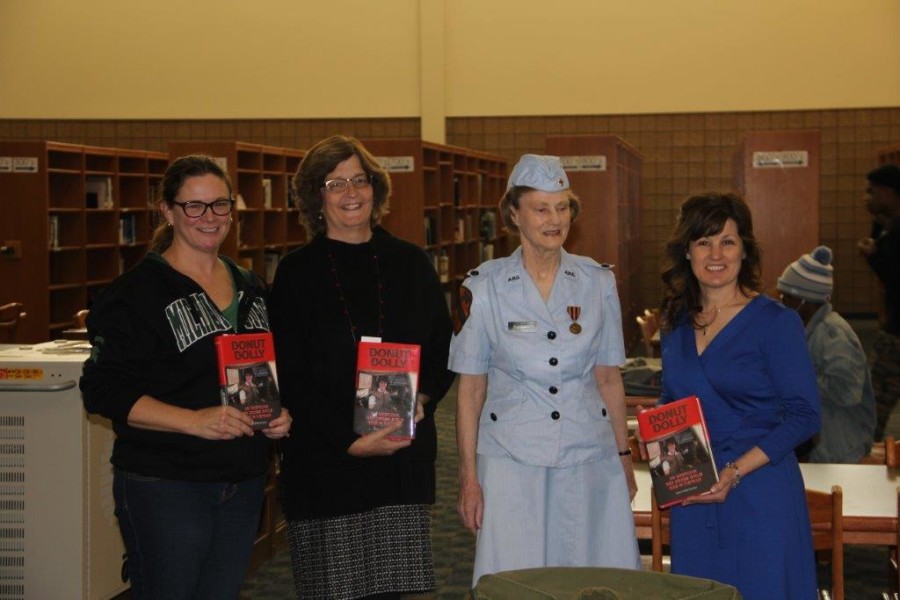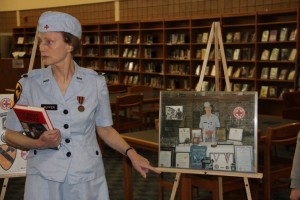Joann Puffer Kotcher gingerly admonishes her army green jacket and explains the history behind each patch that she gathered from various combat units in Vietnam when she served as a Donut Dolly. The name Donut Dolly came from a time when young women passed out donuts to those in combat and Puffer Kotcher was one of the 627 women who served in this capacity.
Puffer Kotcher wants to make sure her stories are heard everywhere. Her goal is to have her experiences known and for people to be aware of what soldiers back then and even now go through every day at war and in the army.
“I think a lot of people have the wrong idea about our soldiers. They’re human. I mean, there are lots of stories that I have; that they’re some of the good people that we have among us, and we should be grateful for them,” Puffer Kotcher said. “They appreciate our freedom. Their buddies died for it!”
Puffer Kotcher and other Donut Dollies during the Vietnam War paved the way for women to be able to work in many different positions. Puffer Kotcher and very few others were selected to bring joy to the soldiers who fought every day for the U.S.
“We were the first women in the history of this country to be allowed in a combat zone,” Puffer Kotcher said. “We were invited by General Westmoreland, who was the supreme commander of Vietnam at the time, and since we were such a success, other women have been allowed in all kind of military jobs. In those days, women weren’t allowed in many many different places, so that’s the historical significance of it.”
Puffer Kotcher likes to sustain her title as a former Donut Dolly because Donut Dollies are different than nurses. Donut Dollies got to stay with the soldiers in the fields and bunkhouses, while nurses and most others had to stay back at the unit.
“Well, one thing, the nurses were not allowed to fraternize, or be friends with, or associate with enlisted men, because they are officers, and that was to protect them,” Puffer Kotcher said. “The nurses stayed in the hospitals. We would go to field-hospitals where there were no nurses, there were cormen, and we would go out to the foxholes. We would travel out to the field, we would walk around.”
Puffer Kotcher kept a diary throughout her 12 months in Vietnam. It was her mother’s idea, and it proved to be very handy.
“And I didn’t get down to that diary after I got married, and had kids, and got them through school and got them off to college,” Puffer Kotcher said. “I got out the diary, and it’d been 35 years, and I read stories I had no memory of.”
Puffer Kotcher traveled to and from many units during her time in battle. She met many inspirational people and the mementos she keeps from those days still bring tears to her eyes.
“Well, this guy was going home, he was from Georgia, he didn’t need a heavy coat in Georgia, and he wanted to do something really nice, and he took it off and he gave it to me,” Puffer Kotcher said. “I said, ‘Oh no, you can’t do that!’ And he said, ‘I don’t need it and I want you to have it,’ so I did. And then I was transferred from that unit and I had to take that patch off, and put on the patch of the unit where I was going, and I didn’t know what to do with it, so I sewed it on the inside. I would remember him. And then I was transferred again, and I wanted to remember all of those fine people.” Puffer Kotcher continued, choking up, “I put [the next patch] on the inside, and I got transferred again, and again, and again, and then when I took the coat off, when we got someplace, people saw the patches inside and they said, “Oh! You don’t have our patch! Here, you need my patch!” I had a collection. I have three-dozen patches, but I don’t have one from every unit I visited. And the first one is the Cavalry patch. That’s the first one. Well, it was kind of a necessity. So, this coat grabs everybody. It grabs me, still, after 45 years, or whatever it has been.”
When Puffer Kotcher wrote her book, “An American Red Cross Girl’s War in Vietnam,” she got everything she wrote about fact-checked. Puffer Kotcher had to document everything three times before it got put into her book.
“So, what I had to do was find veterans who were there when I was there and saw what I saw,” Puffer Kotcher said. “I ask them what their name was, what their job was and what major medals they had won. They also told me, after the book came out, and then they had read it, they said, ‘Oh, I was there, and here’s what happened that you didn’t know about.’ And these guys would tell me, ‘Oh, I knew that bridge. They blew it up just after you left.’”
Puffer Kotcher’s book has won several awards. It is the only book about the Vietnam War written by a woman. Her book is an easy, detailed read that explains Puffer Kotcher’s life and stories while in Korea and Vietnam for a year each.
“The American Association of Librarians has reviewed it and recommended it for school libraries and public libraries,” Puffer Kotcher said. “I wrote it with my husband, who is a journalism major and a professor, and we wrote it so it’d be appropriate for 8th grade and above, so I think that high school would enjoy it. The only book about the Vietnam War written by a woman. And I’m the only Donut Dolly in Michigan.”
Anyone can buy this factual book of living history online on Joann’s website, at http://donutdolly.vpweb.com.
“You can get them from me, on my website, and I’ll sign them,” Puffer Kotcher said. “They’ve had them at the museum; that’s where we did the book launch! It’s on Amazon, it’s on the publisher’s website, but the only way you’re going to get it autographed is if you buy if from me.”
ONE OF PUFFER KOTCHER’S ANECDOTES
Well, there’s one on the website. Gol, I have so many. The one on the website is when we were flying around in the jungle, dropping down to the special forces units that were dotted around in enemy territory, and a storm came up, and it got between us and home base, and it started to get dark. And it was definitely not safe to stay after dark. The VC owned the dark. They would attack everything.
The storm was so bad, all the time, nobody flies through a storm, because they just expect the thunder and lightening, and the winds to rip a helicopter apart. So, our choice was stay on the ground and massacred by the VC, or fly through the thunderstorm and get struck by lightning and crash. So, they sat around and laid out the problem, and then everybody looked at me to make the decision.
And I didn’t know why [they all looked to me] until years later when I was writing, and I thought, “Maybe I can answer this question!” And I had a neighbor who was a submarine officer. And I asked him, I said, “Why did they ask me to make the decision?” And he said, “Because you are a civilian. No military person can order a civilian to do anything. And whatever you decide, they have to do it.”
I decided to take my chances with God! And on the way out, the storm just threw the helicopter around the sky. The lightning struck all around us, and there was a blinding flash, and the helicopter jolted, and all the lights went out. And I thought, “We’re going to die! We’re going to die!” And then the lights came back on, and the helicopter straightened out, and flew on.
And I didn’t know until 35 years later, when I was writing the book, what actually happened! We were hit! We were hit! But, in Vietnam, all the helicopters had a metal body, and, according to physics, it will travel around it without entering into the helicopter! And then it will feed off to the ground, but the big deal is, so that’s a Faraday cage, but the big deal is, the helicopter rotor is the highest point on the helicopter; it’s flying around up there. Lightning comes from above! Chances are, if lightning strikes a helicopter, it’s not going to strike body, it’s going to strike the rotor, because it hits the highest point. If lightning strikes the rotor, the rotor will explode. That’s the wing! And an airplane with no wings does what? Falls like a rock!
A thousand to one, a million to one chances, I don’t know [why that didn’t happen]. God decided we weren’t going to die that day! Whether it was because he had something for me to do, there were seven people in that helicopter, it could have been any one of them! The gunner in the back, he was asleep! Maybe it was for him! Those guys can sleep through anything! I was scared to death! That’s all I can tell! Why? I shouldn’t be here. That’s one of several reasons why I shouldn’t be here. Because of that year in Vietnam.
Maybe [God] said, “Ok, we got a helicopter full of good folks…let’s save them.” I mean, there’s one guy who told me he was walking through the jungle and he felt somebody grab his shoulder and pull him away, and there was a booby trap right there. And he asked everybody who was there, “Who saved my life?” Nobody did. He couldn’t find anybody who knew that they had saved his life, and he said it had to be the hand of God! You sit in a foxhole for a little bit, and you get religion! You start to get grateful!
Well anyway, that’s the story that’s on my website if you need some more details. The form on the website is shortened, but I have two or three more like that!







Sue Reed • Feb 9, 2019 at 5:02 pm
From January 1966 through 1967 I worked for the Red Cross at Wilford Hall Hospital n San Antonio then to Ft. Leonardwood Missouri…We were required o have at least a bachelors degree,and some of the women had masters degrees in Social Work. I never, never heard the term Do nut Dolly applied t myself or to the other young women who did take treats such as birthday cakes to the wards..My ward consisted of young men who were terminal In Missouri my job description was caseworker and thats exactly what i did …….Since that period of my life i have acquired 2 masters degrees and have a social work license…Later on i formed the Dallas Police Social Services deparment…. For some reason, i am quite insulted by the author saying she was a volunteer The women who worked with me would not have joined the Red Cross with this job description the author presented…..I would like to discuss this wih the author if you could pass it on Sue Reed LCSW